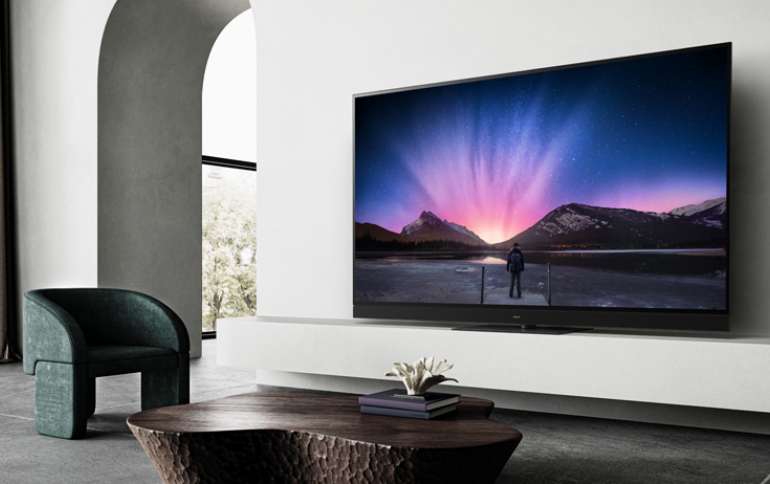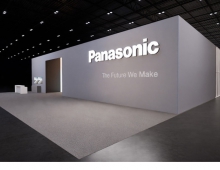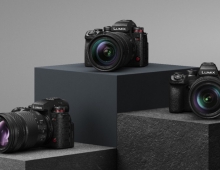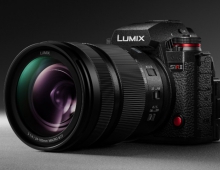
Panasonic introduces LZ2000, its flagship OLED for 2022
Panasonic today announced the launch of its flagship OLED TV for 2022, the LZ2000, available in 55, 65 and, for the first time, 77-inch sizes.
Thanks to their Hollywood tuning and superb colour accuracy, Panasonic OLED TVs have always been the best choice for viewing films and high-quality TV series. To make the LZ2000 a gaming powerhouse too, improvements include an information and settings overlay called Game Control Board, automatic NVIDIA GPU detection, improved 60Hz latency, and HDMI2.1 support.
Panasonic endeavors to deliver the optimum picture and sound quality to users, regardless of the type of content they are viewing, or where and when they are watching it. This continues with nuanced picture optimisation based on the ambient light colour temperature and smoother Auto AI genre detection.
The complete overhaul of the front-firing speakers also unlocks brand new usability, allowing sounds to be directed accurately within a room.
PICTURE OPTIMISED FOR TIME OF DAY OF VIEWING
The LZ2000 uses advanced sensors to detect the ambient room light colour temperature and adjusts the picture in a nuanced way to deliver a more natural experience when, for example, watching at nighttime.
This new feature builds on Panasonic’s Auto AI mode, introduced last year, which uses Artificial Intelligence to identify in real time the content being played, in order to be able to automatically optimise both picture and sound quality for that type of content. The concept is to deliver the optimum picture and sound quality to all users, regardless of the type of content they are viewing, without the user needing to change the settings every time.
For 2022, in order to also optimise for the time of day, the LZ2000 uses a sensor to detect the ambient light colour temperature. This is crucial, as humans perceive ‘white’ differently based on ambient lighting. For example, most European homes use warm-coloured lights at nighttime, meaning that on-screen white can be perceived as blueish and too cold. The new sensor works together with the HCX Pro AI processor to adjust each tone individually in the most realistic way based on the ambient light, thus delivering a more comfortable evening viewing experience. The HCX Pro AI chip works in a very intelligent and nuanced way, preserving colours with which the human eye is familiar, such as skin tones, so as to ensure a natural picture.
Auto AI mode now also auto-detects what type of content you are watching even more smoothly, and automatically adjusts to the ideal picture and sound quality accordingly. For example, if you’re watching high-quality film content, the AI creates an experience that transports you to the cinema. But if you’re watching the Qatar World Cup, the LZ2000 will detect that and take you virtually to the stadium itself.
These features are designed to ensure that people are getting the most out of their TVs without them having to manually adjust the settings for each occasion. If you are the kind of person who feels confident to adjust settings manually, then they can be switched off.
CINEMA QUALITY TUNED IN HOLYWOOD
The LZ2000 comes in 65” and 55” configurations, as well as a new 77” option that we are calling “Master OLED Pro – Cinema Size”.
All three sizes use the very latest 2022 generation “Master OLED Pro” configuration, which has been custom engineered by Panasonic to deliver even more brightness through improvements in picture processing. The result is another bump in mid-level brightness, delivering more pop from HDR and improved accuracy in reproducing details in brighter areas.
The new LZ2000 OLED represents Panasonic’s technical accuracy made possible by Japanese knowhow and engineering, combined with the colour-tuning skills of Stefan Sonnenfeld.
Stefan Sonnenfeld, Founder and CEO of Company 3, is a trusted collaborator of some of the world’s best filmmakers. Sonnenfeld is among a handful of leading artists who have championed the power of color grading to tell stories and communicate emotion. Described by NPR as a “da Vinci of the movies,” Sonnenfeld has applied his skills as a colourist to many of the most acclaimed and popular features of the past decade: A Star is Born, Wonder Woman, Man of Steel, Beauty and the Beast, Star Wars: The Force Awakens, Jurassic World, 300 and many more. Like many other leading colourists, he uses Panasonic OLED screens as large-format client reference monitors in his daily workflow. Indeed, Panasonic’s OLED TVs are widely used in studios and post-production houses.
The LZ2000 supports a very wide range of HDR formats, including Dolby Vision IQ, Dolby Vision, Filmmaker Mode, HDR10+ Adaptive, and HLG Photo, the still image format which brings still photography into the HDR world.
AUDIO IMPROVEMENTS – DIRECTIONAL SOUND
The LZ2000 introduces directional sound in addition to Panasonic’s 360° Soundscape all-in-one TV audio package capable of delivering Dolby Atmos immersive audio experiences. The multiple built-in upward-firing, side-firing, and front-firing speaker units produce a spatial soundstage with Dolby Atmos content.
Panasonic was the first TV brand to introduce built-in upward-firing and side-firing speakers and this year Panasonic has completely overhauled the front-firing speakers, replacing them with array speakers (multiple speakers arranged in a row) which run the entire length of the TV behind the front speaker grill.
These array speakers offer a number of benefits, including a wider sound stage and also more precise, clear audio – in addition, they also allow directional sound. Using a very intuitive and simple-to-use GUI, the LZ2000 makes it possible to adjust the relative loudness of the audio in different parts of the room. It comes with three modes: “Pinpoint” mode which allows the sound to be directed to one specific point; “Area” mode, which allows you to shift the sound to a group of people in a specific area of the room; and a “Spot” mode which boosts the volume in one particular spot while others can still hear the sound.
Directional sound unlocks new usability benefits. Parents with young children sleeping behind a wall on one side of the room can direct the sound away from them so that the children can sleep peacefully whilst still allowing the parents to enjoy great sound. Another practical application is being able to boost the volume for a viewer who is hard of hearing but not for other viewers.
IMPROVEMENTS TO GAMING EXPERIENCE
Panasonic’s LZ2000 delivers even more improvements for the growing number of gamers who choose Panasonic TVs as their gaming monitor of choice.
A brand new feature called `Game Control Board` collects all relevant game settings and information in one place and presents them as an overlay over the game – so that you never need to leave the game to access them. Furthermore, it can be programmed for access by just one click on the remote control by assigning it to the customisable “my App” button.
The Game Control Board overlay provides access to the following key features and data in real-time:
- Information – this option displays all the information coming from the source game, such as frame rate, HDR metadata, and chroma sub-sampling data.
- Dark Visibility Enhancer – allows the gamer to granularly adjust the near black portion of dark scenes, making it easier to see the route forward or detect enemies hiding in the shadows.
- HDR Tonemap – this shows the current HDR tone-mapping settings, which include “Off” (game console is managing the tone-mapping); “On” (TV is managing the tone-mapping); or Dynamic (TV analyses incoming frames in real time and produces dynamic tone-mapping on a scene-by-scene basis, even when source is static HDR).
- Input Lag and VRR – display and adjust Input Lag and VRR settings.
- Viewing Mode – allows the gamer in real time to change the viewing mode and see the effect live in order to select the appearance he or she prefers.
Other new features include “SPD Auto Game Mode”, the automatic detection of compatible HDMI2.1 4K HFR/VRR-supporting NVIDIA GPUs (e.g. RTX30--) allowing the LZ2000 to automatically optimize both the input lag and VRR settings to deliver perfect game play performance.
Panasonic has also further reduced the input lag for 60Hz games, which are supported by the majority of games consoles through the new `60Hz Refresh Mode’.
Out of the box, the LZ2000 will support key HDMI2.1 features such as High Frame Rate (HFR) and also Variable Refresh Rate (VRR) at 120Hz in full 4K resolution. This makes the LZ2000 the ideal match for the latest gaming consoles. Thanks to VRR support, the LZ2000 can solve many of the potential console-side problems such as judder and tearing if rendered resolution and LOD (level of detail) is too high, or there are too many effects or objects rendered at the same time. With VRR ON, the TV and the console synchronise the frame pacing to provide a smoother experience.
MY HOME SCREEN 7.0 IMPROVEMENTS
The LZ2000 features the latest iteration of Panasonic’s highly evaluated smart TV OS, My Home Screen 7.0 which supports all major video streaming services and includes some improvements in terms of accessibility and also to the myScenery function.
With the LZ2000, consumers will be able to access all related accessibility settings through a quick menu, which also triggers voice guidance automatically. The new accessibility menu also provides a variety of useful features. Voice control, audio descriptions, audio dialogue enhancement and hard-of-hearing subtitles can be configured easily.¹
In addition to these important accessibility improvements, the LZ2000 also helps you relax. The myScenery feature, which allows you to choose a selection of restful images and videos², has added more still imagery and also a set of relaxing nature sounds from the Joy Foundation, inc.³ which have been collected from all over the globe, including from Hawaii, Madagascar, and also Nepal.
The LZ2000 also supports major voice services built-in, allowing users to operate some key TV functions using just their voice.
¹ This paragraph refers to the European and UK model of the LZ2000.
² In collaboration with LoungeV Studio (www.loungev.com)
³ Production/editing: Healing Garden / Joy Foundation, inc.; Creative Producer: Keiichiro Kita; Field Recording: Satoru Nakada, Takuya Mori; Edit& Mix: Team KJR Studio; Editorial supervision: The Society for Harmonic Science (https://www.sound-healing.jp/)





















